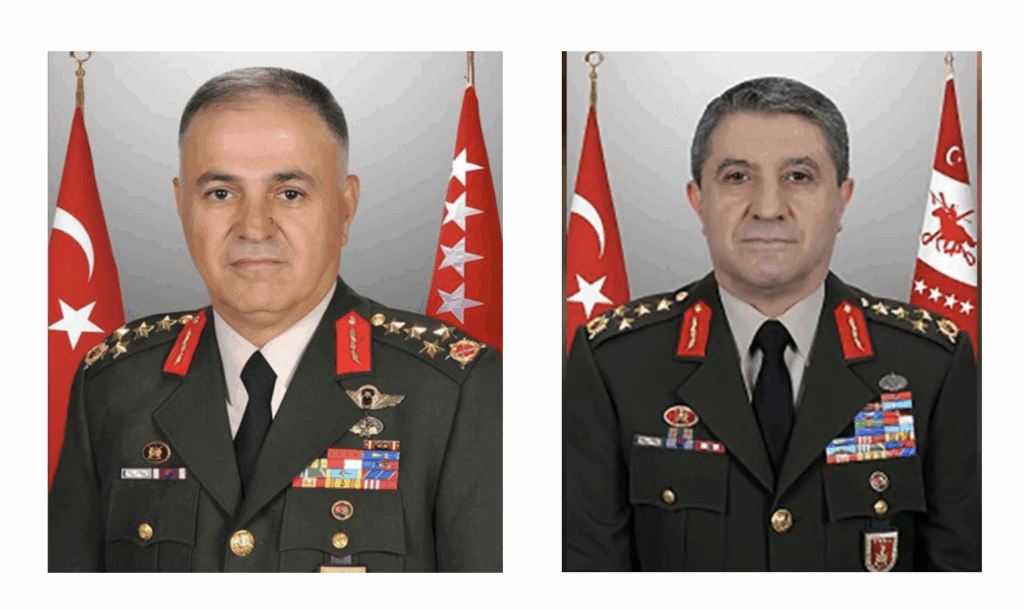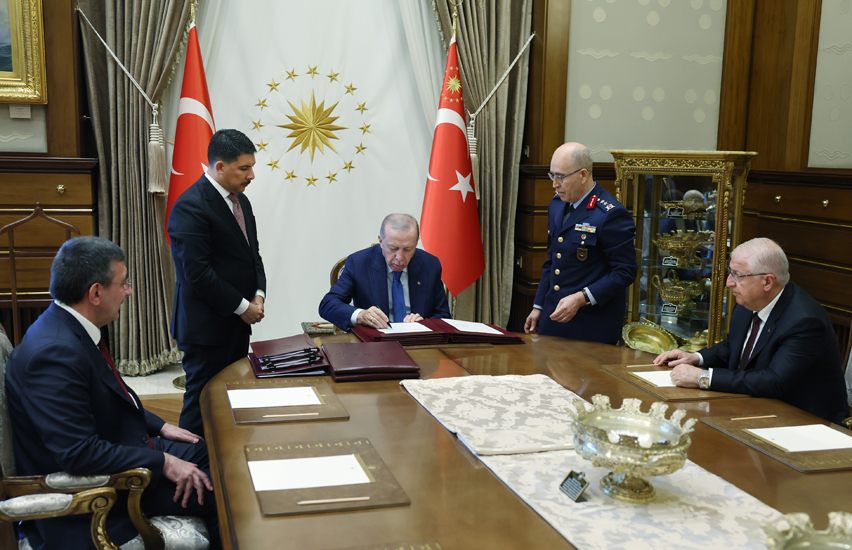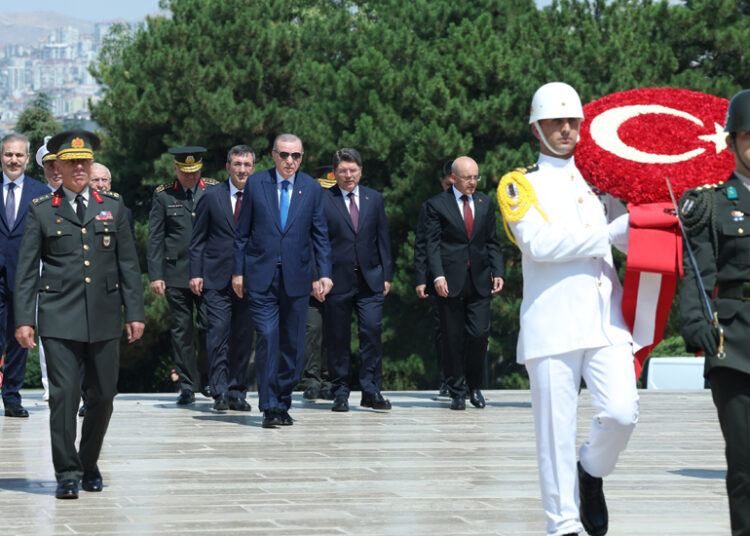Levent Kenez/Stockholm
With the 2025 Supreme Military Council decisions, it has once again become clear that advancement in the Turkish Armed Forces (TSK) depends on loyalty rather than professional merit. Since a coup attempt in Turkey on July 15, 2016, President Recep Tayyip Erdogan has overseen a broad restructuring of the military, removing officers he deemed disloyal and replacing them with Islamist figures considered politically aligned with his government. The 2025 meeting of the Supreme Military Council (YAŞ) produced a new round of senior changes and promotions reflecting that pattern.
The YAŞ meeting took place in Ankara on August 3 under the chairmanship of Erdogan and lasted two-and-a-half hours. The meeting concluded with a series of announcements affecting the top levels of the TSK. The most notable decision was the early retirement of Chief of General Staff Gen. Metin Gürak, whose term had been set to continue for two more years. He will be replaced by Land Forces Commander Gen. Selçuk Bayraktaroğlu. The stated reason for Gürak’s retirement was a lack of available positions, which was seen as strange because there is no position above the chief of general staff in the Turkish military.
Gürak had been regarded as one of Erdogan’s favored commanders. During the events of July 15, 2016, he supported the government as the coup attempt unfolded. Many opposition figures have since claimed that the coup attempt was in fact a false flag operation organized by the National Intelligence Organization (MIT) and then-chief of general staff Hulusi Akar to remove officers in the military considered disloyal to Erdogan.

Gürak had previously commanded several units, and after the death of his wife in 2020 focused even more intensely on his professional duties. In July 2025 the armed forces under his command experienced two incidents that attracted widespread public attention. On July 6, during an operation in northern Iraq, 12 soldiers died from toxic gas after entering an empty cave. The Ministry of Defense reported that its investigation found no negligence, stating that a reconnaissance dog had entered the cave and returned, leading soldiers to believe it was safe. However, experts later pointed out that lighter poisonous gases tend to rise and can evade detection by animals and that specific instruments are needed to identify such substances. Later that same month, on July 26, two soldiers died during training exercises in Hatay province in extreme heat conditions.
General appointments made at the 2025 Supreme Military Council:
Gen. Bayraktaroğlu, 64, was named as Gürak’s successor. Bayraktaroğlu had been commander of the Land Forces since 2023 and previously served as a mechanized infantry brigade commander between 2009 and 2011, his only assignment leading troops in the field. Military experts noted that it was the first time in the history of the Turkish Armed Forces that a chief of general staff had been appointed with such limited troop command experience.
In 2025 he approved the dismissal of five newly commissioned officers from the Turkish Military Academy after they chanted “We are the soldiers of Mustafa Kemal,” a reference to the founder of the secular Turkish Republic, during their graduation ceremony. A military disciplinary board had initially recommended a reprimand, but Bayraktaroğlu authorized their removal from the service. Bayraktaroğlu is from Turkey’s Black Sea region, the same area where Erdogan was born and raised, a detail that has traditionally been considered significant in political and military appointments during his presidency.
Following Bayraktaroğlu’s move to the top post, Gen. Metin Tokel, commander of the 1st Army in Istanbul, was promoted to lead the Land Forces. His appointment bypassed three more senior generals: Gen. İrfan Özsert, commander of the Aegean Army; Gen. Kemal Yeni, deputy chief of the general staff; and Gen. Levent Ergün, commander of the 2nd Army. In another unusual move, a brigadier general without staff officer training was promoted to lieutenant general.
The council also extended the terms of Naval Forces Commander Adm. Ercüment Tatlıoğlu and Air Forces Commander Gen. Ziya Cemal Kadıoğlu by one year. Both officers are regarded by the government-aligned media as among Erdogan’s favored commanders, a reputation linked to their roles during the events of the July 15, 2016 coup attempt and their publicly expressed loyalty to the president.

The promotions list included two generals or admirals advancing to a higher rank and 61 colonels elevated to the general or admiral ranks. The terms of 29 generals and 478 colonels were extended by one and two years, respectively. Two generals were retired due to reaching the military’s age limit of 65, while 43 generals and admirals were retired for what the ministry described as a lack of available positions. As of August 30, 2025, the total number of generals and admirals in the Turkish Armed Forces will increase from 316 to 332.
Unlike in previous years, the Ministry of Defense did not publish the list of colonels retired in the 2025 decisions. The ministry stated that notifications would be made individually to those affected. Without a published list, the identities of the retired colonels and the reasons for their retirement are not publicly available.
The structure of the Turkish Armed Forces has been altered significantly since 2016. Following the coup attempt, the government closed all military academies and replaced them with the National Defense University, a civilian-administered institution. A new staff officer examination system was introduced to allow for closer vetting of candidates. According to official admissions, members of SADAT, a private paramilitary company founded by a former Erdogan adviser, have participated in selection committees for military cadets. The government also allowed graduates of imam-hatip religious high schools to apply to become officers, a departure from the previous secular admission standards.
In a speech at the National Defense University in 2024, Erdogan said that 1,524 of the 1,886 staff officers serving before the coup attempt had been expelled from the armed forces. Overall, 10,468 officers were dismissed from a pre-coup total of 32,189. Figures from the defense ministry show that 24,339 personnel— including officers, noncommissioned officers and civilian staff — have been dismissed since 2016. The government says that 8,651 members of the military participated in the coup attempt. Out of 325 flag officers on active duty at the time, 42 remained in their positions or were promoted in the years following the events of July 15, 2016.
In addition to restructuring the education and promotion systems, legislative changes have been proposed to give the president greater authority over the advancement of officers. In 2020 a bill was introduced to grant the presidency the power to override time-in-rank and posting requirements for promotions. The bill was withdrawn after public debate but remains a potential agenda item for parliament.
The 2025 YAŞ decisions will take effect on September 1.












